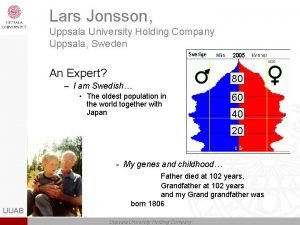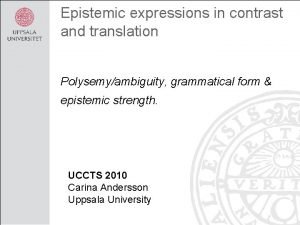Prof Dominic Power Uppsala University dominic powerkultgeog uu




















- Slides: 20

Prof. Dominic Power Uppsala University dominic. power@kultgeog. uu. se The cultural economy and the geography of cultural production? Ekonomisk geografi

Harder to hold onto manufacturing agriculture, fishing jobs due to increased global competition

Advanced countries switching to service and knowledge based industries

The cultural economy and the new dynamics of competition • Products and markets are also changing… it is design, aesthetics and experiences that sell and create added value • People are changing… the post-materialist generation don’t want factory jobs • How do firms/economies cope with this? – They outsource production and low grade services – They change the way they compete: they attempt to create monopolistic competition (Chamberlain)

The new cultural economy Cultural industries… 3 main characteristics: 1. The value of products/services is their symbolic/experiential/status role “Whatever the physico-economic constitution of such products, the sectors that make them are all engaged in the creation of marketable outputs whose competitive qualities depend on the fact that they function at least in part as personal ornaments, modes of social display, aestheticized objects, forms of entertainment and distraction, or sources of information and selfawareness, i. e. as artifacts whose psychic gratification to the consumer is high relative to utilitarian purpose” (Scott 1997, 323). 2. Engel’s Law 3. Tend to agglomerate… whilst their products flow freely around the world.

What do I mean by ‘the cultural industries’? ? • • • Advertising Architecture Broadcast Media Design Fashion - Clothing Film The ‘Finer’ Arts Furniture Glass, Ceramics, Cutlery, Crafts, etc • Jewelry • Libraries, • • Museums, Heritage Music Photography Print Media Software, New Media • Related industries: tourism, hotels…

Scandinavian Cultural Industries • Significant employers • Higher than average growth in both employment and firm numbers Number employed % of workforce Sweden 364735 9. 2 Norway 188842 9. 1 Finland 190049 8. 9 Denmark 264328 9. 7

Growth at a Regional Level Percent change in CI Employment 1995 -99 at municipal level (figures in brackets the number of Nordic municipalities in this range)

1 2 3 4 5 6 7 8 9 10 11 12 13 14 15 Municipality Stockholm Oslo Helsinki København Göteborg Århus Malmö Espoo Bergen Tampere Odense Aalborg Turku Bærum Trondheim CI employment 83225 52173 43695 42620 30218 21245 16970 12655 11893 10998 10047 9609 8916 8215 7853 % change 95 -98/99 +33. 00 +40. 60 +38. 02 +7. 08 +28. 03 +19. 47 +23. 82 +24. 84 +19. 41 +13. 74 +10. 50 +19. 28 +17. 04 +35. 96 +34. 06 • A strong attraction to urban areas Employment in municipalities 1999

• Different industries different urban ‘fixes’ • Elizabeth Currid and Sarah Williams use paparazzi pictures to map the ‘buzz’

Elizabeth Currid and Sarah Williams use paparazzi pictures to map the ‘buzz’

2 world class music agglomerations… Kingston, Jamaica • High-speed innovation based on small firms/individuals who are intensely competitive rivals… get it out as quick as possible (flood the market) before someone copies/steals it • The global 'majors' have no direct presence • Global copyright enforcement made difficult by: 1. A fragmented and small scale firm structure 2. Relatively recent arrival of copyright law (1993) 3. Lack of direct links with the majors (who have the power to both exploit and protect copyright) 4. Certain musicians religious, cultural and ideological opposition to private property 5. Underdeveloped nature of performers organisations and industry representatives • Poor facilities, lack of instruments, lack of international know-how, culture clah with the global business (grab the cash v. long term) Stockholm • A really rich industrial system/chain which aims at creating long term success… staggered releases of singles (4 months) as intro to the high value product: the album • All the global majors • Trust based working and social and personal networks • Lots of business/money means lots of specialized services: videos, song-writing, mastering…. These are exports (20 -25% of S. music exports) as well as good for Swedish bands • Lawyers, rules, copyrights, collecting societies, industrial organizations, and some rules and regulations

Two equally world class music production centres… One difference: rates of return – Jamaica: 1994 – global wholesale value US$1. 2 billion; gross exports US$291, 000 – Sweden: 1997 – net exports US$411 million The type of industrial and firm structures matter to what an agglomeration produces… but they needed to be connected to the world to profit and not be exploited… need to look not just at the local Conclusion: higher degrees of firm level integration into the wider globalized music industry confer both competitive advantages and better profit retention

What happens in one place effects another place’s success! • In globalized cultural product markets (and indeed almost everything else we produce) the most important thing that happens to your product is not how it is produced but how it reaches the consumer… • The industrial dynamics of the NYC music industry and market are more important for breaking a Swedish band in the US than their music

Gatekeeping mechanism 1: Placing your product before the consumer • Vast amounts of money need to be invested in ’breaking’ an artist/product on the market – Radio promotion – Retail placement costs…

Your NYC ‘record’ store… R. C. pays 50% of store advertising costs Listening posts: 15 times turnover; $1 -$2. 50 DVD End caps/Aframes: 3 -4 times turnover: $1 Your picture in the window: $5 -10000 DVD CD: 3 -4 times turnover; $1. 50

• These costs/activities have associated gate keeping mechanisms… you don’t just need money you need contacts to spend it correctly. • Costs and gatekeeping mechanisms in one market have a special role in determining global priorities and in deciding your chances of entering new markets.

Gatekeeping mechanism 2 • Structures of ownership and capital impose a further set of gatekeeping mechanisms. • Music is part of the wider cultural industries and music firms are most often part of larger corporate groups…

VIVENDI UNIVERSAL - Simplified Business overview 2002 VIVENDI UNIVERSAL Media and Communications Vivendi Universal owns 63 % VIVENDI ENVIRONMENT Environmental services Vivendi Water and Generale des eaux Dalkia Energy Management Water Management Connex Transport Management Onyx Waste Management Universal Music Group Vivendi Universal Games Music Games Vivendi Universal Entertainment, Canal+ Group and Canal+ France Film and TV Cegetel & SFR Vu. NET Telecom Internet

• We must focus on agglomerations, clusters and milieus… but we must also try to understand how places link up and how products continue to evolve as they travel through global systems.
 Power traiangle
Power traiangle Sociologiska institutionen uppsala
Sociologiska institutionen uppsala Uppsala slk
Uppsala slk Lars jonsson uppsala
Lars jonsson uppsala Karuselldagen uppsala
Karuselldagen uppsala Anders berglund uppsala
Anders berglund uppsala Bekräfta faderskap uppsala
Bekräfta faderskap uppsala Silvia stefanova
Silvia stefanova Bodelning
Bodelning Filosofiska institutionen uppsala
Filosofiska institutionen uppsala Endokrin akademiska
Endokrin akademiska Barnskyddsteamet uppsala
Barnskyddsteamet uppsala Sjukanmälan katedralskolan uppsala
Sjukanmälan katedralskolan uppsala Uppsala theory
Uppsala theory Gunnar enlund uppsala
Gunnar enlund uppsala Olle lundin uppsala
Olle lundin uppsala Antagligen
Antagligen Uppsala uppsatser
Uppsala uppsatser Strategisk ledningsgrupp
Strategisk ledningsgrupp Uppsala universitet läkarprogrammet
Uppsala universitet läkarprogrammet Teknisk fysik uu
Teknisk fysik uu






































